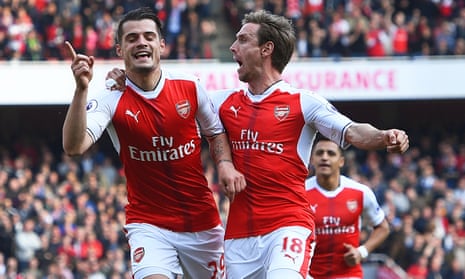It did not take long after Granit Xhaka’s arrival last summer for the jokes to start about how Arsenal would soon take that reputation for whacking in the odd long‑range goal and put a stop to it. An old-fashioned thump hardly fitted in with the Wenger-esque stereotype for walking the ball into the net, for twinkly, over‑elaborate approach play, for fluffy patterns instead of punchy power.
Those quips soon turned to concern as Xhaka’s easy optimism began to be seriously tested. The Swiss midfielder has a reputation around the training ground for being affable and super smiley, pleased to see everyone, a guy who brings his warm personality into work. But this maiden campaign in Premier League football has been a sharp learning curve, with plenty of bumps along the way. The transition has tested him as a player and a man.
Amongst the many technical problems to dog Arsenal’s season, the most unhelpful has taken the form of long-term dysfunction in a Cazorla-less midfield. Xhaka had been recruited from Borussia Mönchengladbach to become a significant building block in that department, but a stuttering start had critics scratching their heads. Shouldn’t a £35m player make a more rewarding impact in the hotly contested midfield heartlands of the Premier League? The main issues appeared difficult to overcome: his sluggish pace; his reckless tackling; his discipline was under the microscope with two red cards and verbal caution from Arsène Wenger about lunging in. “I would encourage him not to tackle,” the Arsenal manager warned in the bleak midwinter, which hardly sounded like a vote of confidence in a new player.
It has not been easy to rebuild his confidence in a team who have been vulnerable for large parts of 2017. But Xhaka is not short of heart and is not the type to give in. It must have felt liberating to experience a big-game moment where he made the difference, and against Manchester United he did just that.
A few minutes into the second half, the game had drifted into a mildly hypnotic spell with not much rhyme or reason when Xhaka ambled into space and decided to have a crack. Half blocking the ball’s flight path was Ander Herrera, who turned away allowing the ball to brush his back, change direction and arc over David de Gea’s outstretched arm. If Arsenal could barely believe their luck, Danny Welbeck turned the enthusiasm levels up further by doubling the lead with a textbook header. Finally, against this old foe, José Mourinho was left stumped.
Wenger has been juggling his midfield consistently this season, trying to find a combination that works. Initially it was Cazorla plus one of the bunch, but since the little wizard succumbed to injury in the middle of October, the desperate effort to find a complementary mix has seen just about every duo imaginable permed from Xhaka, Aaron Ramsey, Francis Coquelin, Mohamed Elneny, Alex Oxlade-Chamberlain and Alex Iwobi. Balance has been an ongoing problem.
Xhaka and Ramsey, who formed the midfield core against United, worked convincingly enough here (much less convincingly at Tottenham last week, though). When pressed the pair miss strength and power, but with time on the ball for Xhaka to probe and Ramsey to make forward runs, both got at United. They were helped by the fizzy energy of Oxlade-Chamberlain and a switched-on Mesut Özil.
Having spent the best part of £90m attempting to improve the team who finished second in the Premier League last season, none of the spinal players Arsenal bought have danced merrily through their first season at the club. Shkodran Mustafi’s fortunes have been mixed, Lucas Pérez has virtually disappeared, and Xhaka has had to keep going through times when he had to question his own performances.
The Swiss limped off here after one of his most polished displays since joining Arsenal, having felt another jolt to the calf that took a knock at White Hart Lane. He is doubtful for the midweek trip to Southampton. The fact that Wenger will not be pleased if he does not recover shows that Xhaka has begun to earn the trust of his manager, and has attained the status of a player on whom who he wants to depend.
The longer-term question of whether Xhaka and Ramsey can become a reliable midfield platform, or merely continue to be the best of an unconvincing bunch, remains moot. A reminder of the standards once set in these parts came from the supporters as they went through some old repertoire classics. Even though the Manchester United supporters sing Patrick Vieira’s name as a taunt dating to the time he conceded possession to Ryan Giggs in a legendary FA Cup semi-final, those were heavyweight days which have proved very difficult to replicate.
The home fans responded by recalling the time they won the league at Old Trafford. It all served as a pointed recap to the best of times. But the references go back to 1999 and 2002. A 21-year-old in the crowd today would have done well to remember either event.
Both Arsenal and United find their modern eras more complicated, more flawed. But as Xhaka seized his moment to demonstrate, there is no need to give up the ghost just yet.

